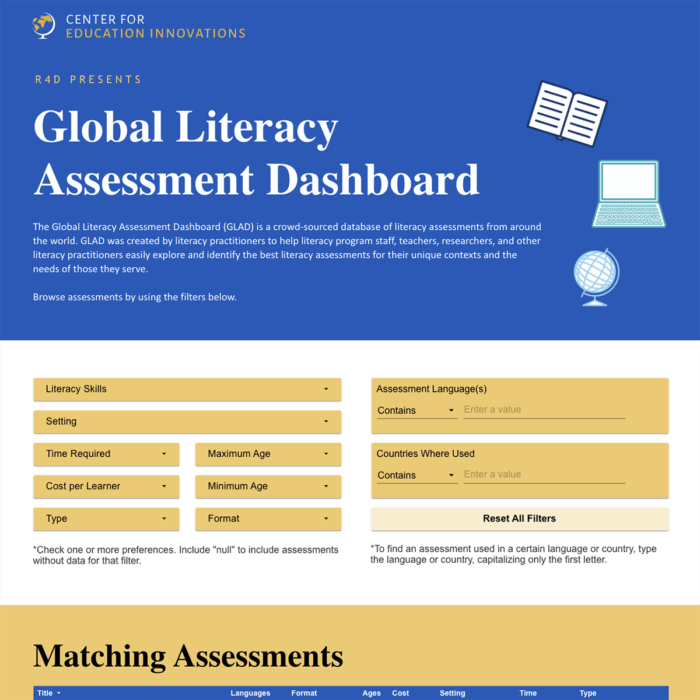WASHINGTON, D.C. — Results for Development’s Center for Education Innovations (CEI), the largest virtual community and interactive knowledge hub for global education practitioners, organizations, donors, and supporters, just released a crowd-sourced database of literacy assessments from around the world.
The “Global Literacy Assessment Dashboard” (GLAD) was spearheaded by members of the Project Literacy Community of Practice, supported by Pearson, and facilitated by CEI. It was developed through extensive discussions and collaboration among literacy practitioners from various organizations and disciplines — including monitoring and evaluation experts, education donors, and assessment researchers.
“Learning assessments are a critical part of delivering quality learning experiences to children and adults, but finding the right assessment for a given context can be tricky and time consuming,” said Sonaly Patel, a program officer at R4D. “In our literacy community of practice, we found that many literacy practitioners still struggle to find literacy assessments that can be adapted to their local language and culture — and that are affordable and practical for use in organizations of different sizes. Recognizing the need to make information on literacy assessments more easily accessible, CEI partnered with Project Literacy and our community of literacy practitioners to launch the Global Literacy Assessment Dashboard.”
Literacy program staff, teachers, researchers, and other literacy practitioners can use the dashboard to easily share, explore, and identify the best literacy assessments for their unique contexts and the needs of those they serve. Dynamic filters allow practitioners to quickly search for assessments by literacy skills, time, costs, age, language, and more. They receive a list of assessments matching their search criteria and, on the next page, they have the option to access more detail on each assessment, including links to the assessment, countries where the assessment has been used, evaluator requirements, implementer experiences, and equity guidelines.
Amit Pathak, Research Fellow at Australian Council for Educational Research (ACER) India and a co-creator of GLAD elaborated: “We designed GLAD to give voice to practitioners worldwide and envisioned a democratic tool made with contributions from the ground-up. We celebrate each contribution in the database and invite practitioners to submit and share new assessments in various languages with the world.”
Literacy practitioners, researchers, and educators are invited to share information on literacy assessments they have found helpful through the submission form: http://bit.ly/3a6FMQi.
GLAD is part of a series to tools and resources that were collaboratively developed with more than 100 literacy practitioners from over 20 countries to help literacy programs overcome shared challenges.
The first four tools — the Storytelling Roadmap, Literacy Measurement: A Holistic Framework, Increasing Parent Engagement in Children’s Literacy, and Teacher Resource Inventory — were designed to help literacy practitioners more effectively advocate for their work, create more holistic measurement strategies for literacy programs, understand parental realities to design better parent engagement programs, and find tools to localize literacy teaching. These tools and more are housed on the CEI website.
Catch up on the series:
- “Tools and resources we created with 100+ literacy practitioners”
- “A practical tool to increase parent engagement in children’s literacy”
- “A teacher’s one-stop shop for localized literacy tools”
###
About Results for Development
Results for Development (R4D) is a leading non-profit global development partner. We collaborate with change agents around the world — government officials, civil society leaders and social innovators — to create strong systems that support healthy, educated people. We help our partners move from knowing their goal to knowing how to reach it. We combine global expertise in health, education and nutrition with analytic rigor, practical support for decision-making and implementation and access to peer problem-solving networks. Together with our partners, we build self-sustaining systems that serve everyone and deliver lasting results. Then we share what we learn so others can achieve results for development, too. For more information, visit our website at: www.r4d.org.














